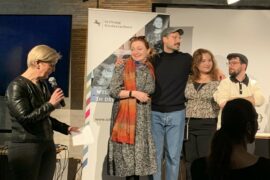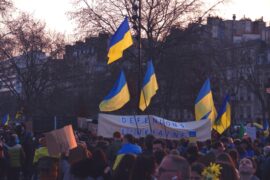Ukrainian writer Serhiy Zhadan creates poems that are both compressed and panoramic: In them, war is explored as an undoing of life and meaning, both personal and collective. His work is an open question to life, perhaps a question without an answer: what can be said in the face of annihilation?
By Sofija Popovska
They all were killed at once—both older guys,
and the young one.
Silence between the riverbanks.
You won’t explain anything to anyone.
Serhiy Zhadan, »A Bridge Used to be There, Someone Recalled«
A language is a system of symbols. As a system, it is governed by an internal logic; as a mode of communication, it exists to convey meaning. To humans, language and the world are reciprocal realities. The world becomes language, and language – fraught as it is with implications both individual and cultural – shapes the way we interact with, and thereby change the world. When something in the world is indescribable, it is because it is inaccessible to human logic; when feelings are no longer capable of being verbalized, it is symbolic of a loss of inner meaning and structure – a fall into the absurd.
So, what can be written about a homeland that is there one day and gone the next? About people who existed moments ago, but are now absent from the world? What can be said about the annihilation of a loved one? Without its destination, love becomes a question without an answer. A question reaching into the void, searching for something no longer there – is that not absurd?
The symbols that usually mark extinguished lives are numbers. Death tolls consume leveled homes and vanishing faces, futures curling up and turning to ash like old photographs, only to produce a summary of the unsummarizable, a collective unmarked grave for multitudes of infinities. To write their lives in numbers and not words is to abandon them to erasure. In this sense, poetry is an antidote. Enter Serhiy Zhadan. Zhadan’s poetry embraces the absurd and endows it with a voice; it is a monument to the call into the void.
An Imaginary Life-Line
Born in 1974 near Luhansk and currently living in Kharkiv, Serhiy Zhadan is a Ukrainian poet, novelist, essayist, playwright and translator. What followed after his first publication at the age of 17 was a prolific and successful literary career, earning him a number of prizes in various countries, such as the 2006 Hubert Burda Prize for young Eastern European poets in Austria, the 2009 Joseph Conrad Korzeniowski Literary Award in Ukraine, the 2014 Jan Michalski Prize for Literature in Switzerland, the 2015 Angelus Central European Literary Award in Poland, and the BBC Ukrainian Book of the Year award in 2006, 2010 and 2014. Formally educated in philology, Zhadan creates poetry with a sweeping vision of the world’s inner workings and a form that conveys it on a visceral level.
Zhadan’s work is a meditation. Devoid of meter and rhyme, his poetry nevertheless retains a pulse: the lyrical narrator’s eye glides over mundanity and devastation, one step at a time, one image per heartbeat. The only way a mind might consume suffering and not shatter. An imaginary life-line on the monitor of a free verse poem. Spike: »They all were killed at once—both older guys, and the young one.« Flat: »Silence between the riverbanks. You won’t explain anything to anyone.« The mind, retreating into a protective cocoon of diaphragmatic breathing, aligns with the rhythm of life. From a point of view anchored in alienated lucidity, Zhadan narrates about a family burying their son, about a bomb leaving a cataclysmic full stop in the place of three friends on a walk, about »schoolchildren who peek into the chambers of death«.
Zhadan is an observer, a witness to the bewildering miracle of cruelty that is often called the complexity of life. His work as a translator, without stopping at the usual limit of mediating between languages, becomes the task of converting into words charred corpses, »the melody of insects«, »the scorched terrain he searched by hand«, »the broken psalmic rhythm of rain«. His poetry is panoramic and perplexing. His words shuffle through vistas of reality like a searching hand, looking for the sense behind piles of dead, heroes upon parents upon partners upon…
Translator Between Death and Poetry
Loss in Zhadan’s poetry is framed by meaninglessness. They Buried Their Son Last Winter is a poem defined by its compressed, bare style. Bare as a homeland emptied of its humans. Bare as a family that has buried its children. »It’s the third year of war; they’re repairing the bridges. / I know so many things about you, but who’d listen?«, asks the lyrical speaker, struggling to come to terms with the possibility that his childhood friend may have chosen the enemy side over his people. Meaning fails him – in the face of death, meaning crumbles: »He fought for someone, they say, but who—who knows? / Will it change anything, they say, what’s the point now?« The final stanza offers no closure, leaving its reader to sit with its insurmountable ambiguity. A frail possibility of healing flickers for a moment between the lines as the speaker’s eyes scale the sky for omens: »The birds disappear behind waves of rain. / To ask forgiveness for your sins«. Hope, however, immediately gives way to uncertainty: »But what do I know about your sins?« The answer is withheld, impossible. Perhaps death has even rendered it unnecessary: »I would have asked him myself, but now—there’s no need. / And he wouldn’t reply—he was buried without his head.« Again and again, death begets aporia. The poem ends on a note of absolute defeat: the only respite that can be had is ignorance – a shelter unreachable for the human mind: »It’s easier for birds, who know nothing of salvation, the soul.«
Zhadan’s work is a socratic question posed to God, who has »got other things to do«. It is a lyrical type of maieutics, a hunt for truth in a world viciously devoid of meaning beyond cause-and-effect. He seems aware of his task as translator between death and poetry. »He read twilight like a book,« Zhadan writes in a poem entitled A Bridge Used to be There, Someone Recalled. In another poem, he records a bird’s-eye view of »the full pages of the streets«.
If a word can change the world, Zhadan’s poetry is the type to make it stop and wonder. A painful pause in the desensitizing informational flow of toponyms and numbers, it allows us to see the film footage panning across a landscape of destruction through the eyes of someone who used to call it ›home‹. Sobering and beautiful, Zhadan’s poetry deserves the attention of all audiences. Any reader will be captivated and touched, regardless of their spatial or cultural distance from current or historical events in Ukraine, if only for the shared experience of being human.






